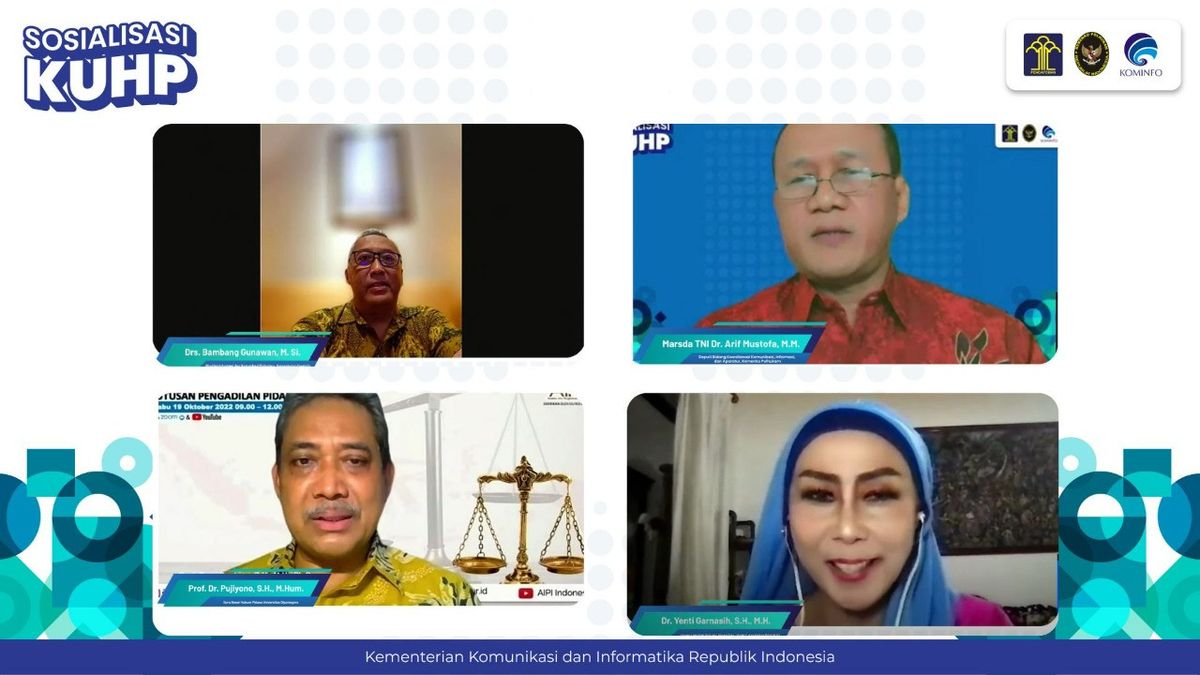JAKARTA - Still in the context of socializing the Criminal Code (KUHP) which was ratified by the DPR RI on December 6, 2022 yesterday, the Ministry of Communication and Information (Kemenkominfo) through the Directorate General of Public Information (Ditjen) IKP again held activities Socialization of the Criminal Code in order to improve public understanding, as well as prevent hoaxes in the community related to the new Criminal Code.
The Director of Information for Communication at the Ministry of Communication and Information, Bambang Gunawan, in his speech said that the realization of a legal state based on Pancasila requires a harmonious, synergistic, comprehensive, and dynamic national legal system through legal development efforts. One process that is being carried out by the Government related to criminal law is to revise the Criminal Code. It's time for our Legal Products to be Independent
Bambang continued, the ratification of the RKUHP into the Criminal Code is a historic moment in implementing criminal law in Indonesia, because after years of using the Dutch Criminal Code, Indonesia currently has its own Criminal Code.
KUHP which has just been ratified has gone through discussions in a transparent, thorough and participatory manner. The government and the DPR have accommodated various inputs and ideas from the public," he explained in a statement received by VOI editors.
Starting the socialization session, Deputy for Coordination, Information and Apparatus, Coordinating Ministry for Political, Legal and Security Affairs, Marsda TNI Arif Mustofa, said that the formation of the National Criminal Code was one of the first legal products mandated to be made in this country of the Republic of Indonesia. He revealed that since independence Indonesia still uses legal products during the Dutch colonial era.
"Therefore, the Criminal Code which has just been ratified is a law that is drafted with the aim of updating or updating the existing Criminal Code, and to adapt it to the current politics, laws, circumstances, and developments of social, national, and state life," he explained.
Arif said that the discussion of the RKUHP itself has been very long, since 1958 until now. According to him, RKUHP itself is a masterpiece and legacy from the process of changing the Criminal Code from colonial heritage to national law.
"The RKUHP is prepared with Indonesian values which are an effort to decolonize the Indonesian criminal system. In addition, the Criminal Code also prioritizes democratization in every discussion of its substance," he said.
However, what has happened recently, Arif revealed that there have been many hoaxes related to the new Criminal Code, so a Ministerial Level Meeting was held chaired by the Coordinating Minister for Political, Legal and Security Affairs on December 8, 2022. He also said that the Criminal Code would only be effective three years after being promulgated, so it did not automatically apply when ratified by the DPR.
"It's not like that, so yesterday there was an issue of Australian tourists more than 1000 canceling trips, and so on. So that kind of hoax news is what we ask for help from Public Information Extensioners to try to neutralize it," he explained.
On the same occasion, Professor of the Faculty of Criminal Law, Diponegoro University, Prof. Pujiyono, said that the Criminal Code of a nation reflects the level of existence of the nation itself. Because according to him, what is stated in the norm in one law book reflects the value system adopted by the nation concerned.
"So if we talk in theory, the law essentially contains two things, especially in criminal law, namely norm and value. So such written norms are based on the concept of the idea of certain values. This is what we then find some things that are diametrically different from what is in the old Criminal Code," he explained.
For example, he explained about the polemic related to cohabitation. According to him, cohabitation is regulated in the Criminal Code because of the realization of the basic idea concept of values that we investigate as an Indonesian nation whose religious society is high, adheres to the values of Pancasila, as well as the very high values of susila and society.
In addition, according to him, politically with the ratification of the New Criminal Code there is a national pride when breaking free from the shackles of a colonial law. He also revealed that sociologically the Criminal Code is based on the basic idea concept of values in Indonesia.
"So here we place Pancasila as a margin of appreciation, Pancasila as the basis for justification for absorbnce whether it is related to local, national, and global values," he explained.
Pujiyono also said that the Criminal Code's renewal used a limited open codification model. According to him, the codification is the complete and systematic preparation of legal materials in a law book. The hope is that when it is compiled in a complete and systematic manner, outside the Criminal Code there will be no more offenses that arise related to criminal acts.
"But then we realized that it was impossible to carry out a closed codification, so the codification that we did was an open codification. This means that the provisions of Article 103 in the new Criminal Code in Article 187 provide space. Even though it has been included in the new Criminal Code, it is still possible to accommodate new developments that are possible to develop outside the Criminal Code," he explained.
In the next session, a lecturer at the Faculty of Law, Trisakti University and the Chair of MAHUPIKI, Yenti Ganarsih said that the recodification was important. Because, there are questions about the New Criminal Code, regarding the many articles that exist in the old Criminal Code.
"Indeed, we do not change everything, because even in the old Criminal Code, the substance of actions that must be used as criminal acts is mala per se, which in almost all of the world are prohibited, namely things prohibited by the holy books of the same religion and the books. human guidelines live in the world, "explained Yenti.
He also said that the RKUHP which has become the Criminal Code originated from the basic idea of goodness, namely the protection of humans, especially Indonesian people, and the idea of protecting appreciation for human rights. In addition, criminal law protects the interests of the national community, community interests, and individual interests.
"We will also be careful to see that so that no Criminal Code wants to enter private spaces in such a way. But if things go into private space, there must be contexts whether it is a context of decency that can be regulated by the nation itself, as things that are usually said to be not a must, but to respect the sovereignty of the countries. Things like this seem to be the talk of the town now, "he explained.
Yenti gave an example of an article related to adultery and cohabitation, where the article is said to have too entered the private space and it was as if everyone would later be exposed to the article.
"Actually, at that time, the article of adultery that we implemented was already in the old Criminal Code in Article 284, made by colonial government at that time, and the article was implemented, but it was very rarely affected by the article. But morally, living law, from the point of view of the Indonesian people who have Pancasila, it is impossible for us to let go of it. Likewise with cohabitation, "he said.
According to Yenti, the new advantage of the Criminal Code is the purpose of punishment and punishment, where this advantage will answer that criminal law is no longer sharp downwards but blunt upwards.
"Later we will see how judges comply with the goals of punishment and punishment. How to interpret it, also to reduce the problem of punishment which is very different for the same or almost the same cases, without reducing the freedom of judges by regulating the purpose of punishment and punishment. This should be corrected, "said Yenti.
The socialization of the Criminal Code which took place in a hybrid manner by presenting 110 Public Information Extensioners (PIP) in the West Indonesia region, and 110 Public Information Extension Officers (PIP) in the Eastern Indonesia region. The socialization material received by PIP is expected to be able to be forwarded to the public regarding the new adjustment of the Criminal Code, in order to prevent the spread of hoaxes.
The English, Chinese, Japanese, Arabic, and French versions are automatically generated by the AI. So there may still be inaccuracies in translating, please always see Indonesian as our main language. (system supported by DigitalSiber.id)













